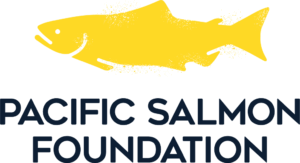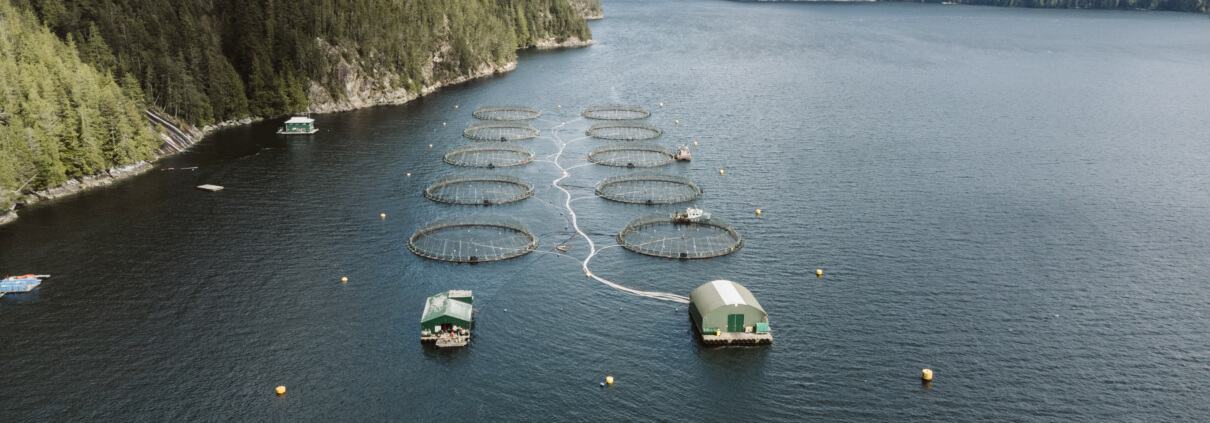Letter: The need for a transition and removal of open-net pen fish farms from B.C. waters
Over the past year, experts at the Pacific Salmon Foundation (PSF) have been actively involved in the DFO’s aquaculture transition public engagement process. PSF supports the Honorable Joyce Murray, Minister of Fisheries, Oceans and the Canadian Coast Guard, and the decision to extend consultation for open-net pen salmon farm transition. The extension underscores the need for economic support of communities impacted by the open-net pen salmon farm transition.
Following a recent meeting with Minister Murray, PSF sent the following letter that supports the need for a transition and removal of open-net pen fish farms from B.C. waters. Independent science, co-led by PSF, shows that viruses, bacteria, and parasites such as sea lice are amplified by open-net pen salmon farms. The risks posed by B.C.’s open-net pen salmon farms ripple across the coast, extending beyond the Discovery Islands and beyond Fraser River sockeye to many Pacific salmon species. Wild salmon need us now and we must address risk factors that we can control to support conservation and recovery.
Download the letter (pdf) or read it below.

June 19, 2023
Hon Joyce Murray
Minister of Fisheries, Oceans and the Canadian Coast Guard
House of Commons
Ottawa, ON KIA 0A6
Dear Minister Murray,
Thank you for meeting with me on June 5 to discuss Pacific salmon conservation and recovery. As I shared with you, the Pacific Salmon Foundation (PSF) has been an active participant in DFO’s open-net pen aquaculture transition plan engagement process, and we continue to offer our support for the consultation and decisions to date to protect wild Pacific salmon with the removal of 15 open-net pen fish farms from the Discovery Islands.
Having co-led research into the impacts of open-net pen fish farms on wild Pacific salmon, PSF scientists and research collaborators have published a body of peer-reviewed evidence that makes clear that open-net pen salmon farms present unacceptable risks to B.C.’s wild Pacific salmon. As you are likely aware, our most recent peer-reviewed science highlights the underappreciated risks posed by farm-source pathogens, Piscine orthoreovirus and Tenacibaculum maritimum — evidence that links disease transfer from open-net pen farms to wild salmon that migrate around the farms.
Given our research and the crisis facing wild Pacific salmon that migrate past the farms, we support the expeditious removal of open-net pen fish farms in British Columbia. This is what the independent evidence says wild Pacific salmon need. We acknowledge the economic and community factors that must be weighed and support the added time through September to advance consultation and thoughtful transition for communities that have seen some economic benefit from salmon farm operations.
PSF respects First Nations authority and we have many partnerships working with First Nations to restore and support wild Pacific salmon populations. We have a lot of work to do to rebuild wild Pacific salmon stocks and it will take all of us. Recovering wild Pacific salmon is a cause that can unite, rather than divide as we have seen with the protracted salmon farm debate.
Investing in jobs that focus on the wild salmon economy, including investing in more First Nations resource Guardians has great potential. From restoring freshwater habitat, to improving grassroots data collection, there can be opportunities for Indigenous and other coastal people impacted by the closure of B.C.’s harmful open-net pen salmon farms.
Given the perilous state of many Pacific salmon populations that migrate past open-net pen salmon farms — that amplify harmful pathogens and sea lice — we believe strongly that moving the farms out of the water is urgent and essential in order to rebuild Pacific salmon stocks in British Columbia. Even DFO’s own science-advice processes have indicated that transitioning open-net pen salmon farms to closed containment is a necessary step in protecting imperiled Fraser River sockeye and Chinook populations.
Based on public polling, 86 per cent of British Columbians rank declining salmon stocks as a top environmental concern and 74 per cent of British Columbians have a negative opinion of open-net pen fish farms. The majority in our province believe the transition away from open-net pens needs to happen immediately.
Wild Pacific salmon don’t have time for us to waver on this decision. Our Nation can’t risk another major fishery collapse, like the Atlantic cod, which serves as a cautionary tale, demonstrating the disastrous consequences of ignoring scientific evidence and failing to implement timely measures for fishery sustainability.
PSF is committed to continue to provide the most current science and data to you and DFO through the engagement process. We are also activating on wild Pacific salmon recovery planning and see great economic value in focusing on salmon recovery across British Columbia.
We all depend on the health of wild Pacific salmon. Right now, wild Pacific salmon depend on you and our elected officials to prioritize saving and restoring this vital species.

Michael Meneer
President & CEO
Pacific Salmon Foundation
Cc:
Standing Committee on Fisheries and Oceans (FOPO)
MP Yves-François Blanchet
MP Elizabeth May
Hon. Pierre Poilievre
MP Jagmeet Singh



